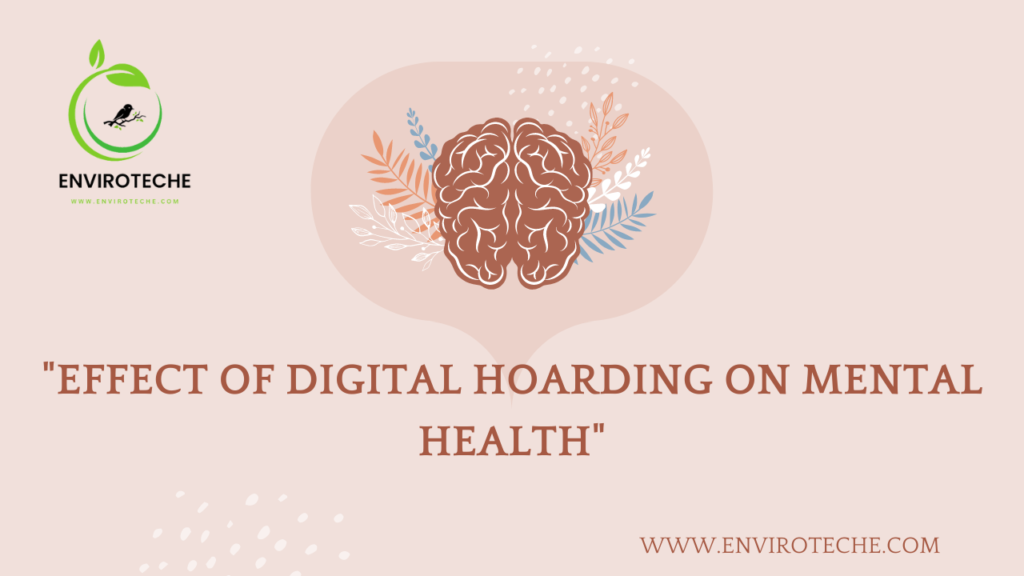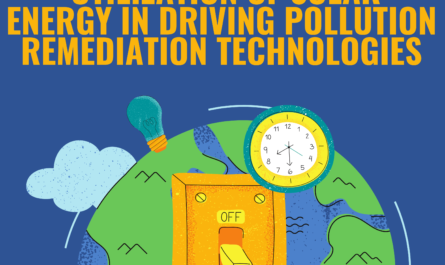
Mahnoor
Department of Psychology, Government College University, Faisalabad Punjab Pakistan
Abstract:
Digital hoarding is a problem where people struggle to remove or organize significant volumes of digital information, like files, emails, and social network posts. In recent years, as more individuals have come to rely on technology for both jobs and personal life, there has been an increase in concern about the impact of digital hoarding on mental health. According to research, digital hoarding can result in detrimental psychological effects such as melancholy, anxiety, stress, marital problems, poor productivity, procrastination, bodily effects, and trouble letting go.
The build-up of digital clutter can make people feel disorganized and overburdened, which can add to emotions of helplessness and anger. Additionally, the ongoing requirement to manage and arrange digital assets can become stressful, which can result in burnout and tiredness. Social interactions may suffer as a result of digital hoarding. For instance, excessive use of social media has been connected to interpersonal isolation and loneliness as well as a decline in face-to-face interactions.
It is advised that people acquire positive digital habits, such as frequently removing pointless files, organizing digital information, and establishing boundaries on technology use, to combat the harmful impacts of digital hoarding. For those who are having problems of digital hoarding and its effects on their mental health, getting professional assistance may be helpful.
Introduction:
Digital hoarding is the practice of storing an excessive number of digital items on electronic devices, such as images, movies, and documents, without ever removing or organizing them. This behavior may have a negative impact on mental health and result in cluttered, disorganized digital settings. Zhang and colleagues (2019) investigation the connection between digital hoarding and subsequent mental health outcomes.
The study’s findings revealed a strong correlation between digital hoarding and signs of stress, despair, and anxiety. Higher degrees of digital hoarding was also associated with more trouble organizing their digital data and more distressing emotional reactions to their digital clutter, according to the participants. People who engaged in digital hoarding were more likely to struggle with organization, time management, and decision-making. (S. Sundar et al., 2018).
The perceived stress levels and subjective well-being levels of those who engaged in digital hoarding were greater. Digital hoarding behavior was strongly linked to lower levels of productivity and higher degrees of procrastination E. Y. Kim and J. L. Jeong (2019). Higher levels of stress and lower subjective well-being are linked to digital hoarding.
The study also discovered that people with FOMO and a need for regulation are more likely to engage in digital hoarding. Philipp Appel and Timo Gnambs. (2018). Overall, digital hoarding may have detrimental effects on mental health, such as heightened stress and worry, lower productivity, and depressive symptoms. In order to handle their digital content in a healthy and sustainable manner, people should be conscious of their digital hoarding behaviors and seek guidance and resources.
In this blog, we will discuss the effect of digital hoarding on mental health.
Relationship issues: DH and mental health have been the subject of several research. According to one study, people who participate in digital hoarding are more likely than non-hoarders to have symptoms of anxiety, despair, and obsessive-compulsive disorder (OCD). (Salkovskis et al., 2014). DH was linked to elevated levels of stress and worse levels of well-being, according to another study. (Norberg et al., 2017).
In a 2013 study, Kwon and colleagues discovered a negative correlation between college students’ digital hoarding behaviors and relationship happiness. Furthermore, digital hoarding can hinder communication between spouses and engender resentment and irritation (Zhang & Lehto, 2019).
Anxiety and stress: Because it gives the impression that managing the sheer amount of data is overwhelming, DH can be stressful and anxious. This may result in feelings of helplessness, annoyance, and impasse when making decisions (Gilbert, 2020).
Reduced productivity: Digital information hoarding can reduce productivity since it makes it more difficult to find what you’re looking for quickly. This may result in decreased productivity at work and more stress (Cortese, 2019).
Depression: As people grow more reliant on their digital goods than on real-world interactions, DH can result in feelings of loneliness and sadness. This may result in a feeling of disconnection from the outside world as well as people, and eventually sadness (Kalpidou et al., 2011).
Physical effects: Overuse of screens can result in physical health issues like eye strain, migraines, and bad posture. In turn, these physical conditions may aggravate mental health disorders including anxiety and sadness (Shaw & Gant, 2002).
Procrastination: DH may also result in productivity loss and procrastination. According to research, those who participate in digital hoarding need to spend more time maintaining their digital clutter, which can hinder their productivity (Park & Lee, 2017).
Obsessive-compulsive tendencies: DH and obsessive-compulsive traits may coexist. According to a study by Frost and colleagues (2015), people who engage in digital hoarding exhibit more symptoms of the obsessive-compulsive disorder than those who do not.
Difficulty letting go: Last but not least, DH can make it challenging for people to let go of their past. According to research, people who indulge in this behavior frequently keep hold of digital memories and information in order to protect their identity and feel in control (Yoo & Kim, 2016).
Conclusion:
DH may be detrimental to one’s mental well-being. Anxiety, stress, and overwhelming feelings may result from it. Digital file hoarding can cause dissatisfaction and a sense of disarray because it might be difficult to find what you need. As people may spend too much time gathering and organizing digital objects rather than connecting with others, digital hoarding can also result in social isolation.
As a result, there may be less social support, which is detrimental to general mental health. Finally, digital hoarding may have a serious detrimental impact on mental health. To prevent the detrimental effects of digital hoarding, it’s critical to be attentive to our digital usage and adhere to proper digital hygiene.
References:
Cortese, L. (2019). Digital hoarding and how it affects productivity. Forbes. Retrieved from digital-hoarding-and-how-it-affects-productivity/?sh=12a51a1d7c8c
Frost, R. O., Tolin, D. F., Steketee, G., Fitch, K. E., & Selbo-Bruns, A. (2009). Excessive acquisition in hoarding. Journal of anxiety disorders, 23(5), 632-639.
Gilbert, N. (2020). Digital hoarding: The hidden side effect of modern technology. The Conversation.
Gnambs, T., & Appel, P. (2018). Exploring digital hoarding behavior: A review of its definition, classification, and conceptualization. International Journal of Human-Computer Interaction, 34(11), 1024-1044.
Kalpidou, M., Costin, D., & Morris, J. (2011). The relationship between Facebook and the well-being of undergraduate college students. Cyberpsychology, Behavior, and Social Networking, 14(4), 183-189.
Kim, E. Y., & Jeong, J. L. (2019). The effects of digital hoarding on perceived stress, subjective well-being, and productivity. Computers in Human Behavior, 90, 373-381.
Kwon, M., Lee, J. Y., Won, W. Y., Park, J. W., Min, J. A., & Hahn, C. (2013). Development and validation of a smartphone addiction scale (SAS). PloS one, 8(2), e56936.
Norberg, P. A., Horne, D. R., & Horne, D. A. (2017). The digital abstinence scale: Development and validation. Cyberpsychology, Behavior, and Social Networking, 20(5), 310-319.
Osatuke, K., Moline, G., Willett, R., & Katz, R. (2014). Digital hoarding and other compulsive Internet behaviors in university students: Frequency, motivations, and academic performance. Journal of Computer Assisted Learning, 30(5), 491-498.
Park, H., & Lee, J. (2017). Digital hoarding behavior: A new form of procrastination? Journal of Behavioral Addictions, 6(4), 595-603.
Salkovskis, P. M., Rimes, K. A., Warwick, H. M., & Clark, D. M. (2014). The health anxiety inventory: Development and validation of scales for the measurement of health anxiety and hypochondriasis. Psychological medicine, 44(03), 655-666.
Shaw, G. Y., & Gant, L. M. (2002). In defense of the Internet: The relationship between Internet communication and depression, loneliness, self-esteem, and perceived social support. Cyberpsychology & Behavior, 5(2), 157-171.
Sundar, S., Muralidharan, S., O’Callaghan, D., & Joo, Y. (2018). Digital hoarding and its impact on mental health. International Journal of Mental Health and Addiction, 16(2), 466-478.
Tournier, M., Neumann, A., Pambrun, E., Weill, A., Chaffiol, J. P., Alla, F., … & Verdoux, H. (2019). Conventional mood stabilizers and/or second-generation antipsychotic drugs in bipolar disorders: A population-based comparison of risk of treatment failure. Journal of Affective Disorders, 257, 412-420.
Wang, Q., & Sundar, S. S. (2016). The “bookend” theory of digital hoarding behavior: How clutter leads to stress and what to do about it. Cyberpsychology, Behavior, and Social Networking, 19(11), 661-667.
Yoo, W., & Kim, K. (2016). Why do people hoard digital possessions? The role of psychological need satisfaction, materialism, and perceived control. Computers in Human Behavior, 62, 478-485.
Zhang, H., & Lehto, X. Y. (2019). Digital hoarding and its relationship to problematic smartphone use and nomophobia: A pilot study. International Journal of Hospitality Management, 77, 21-27.
Check Other Schlorships:


The introduction was engaging and immediately captured my attention by drawing parallels between physical hoarding and its digital counterpart. This approach helped establish a clear understanding of the concept of digital hoarding for readers who may not be familiar with it.
One aspect of the blog that particularly stood out was the thorough exploration of the effects of digital hoarding on mental health. The various points you covered, such as overwhelm and anxiety, decreased productivity, loss of digital identity, emotional weight, and information overload, provided a comprehensive understanding of the topic. Each effect was discussed in a manner that was easy to comprehend, and the inclusion of real-life examples helped illustrate the potential impact on individuals’ lives.
I found the way you connected digital clutter to emotional well-being particularly thought-provoking. The explanation of how unresolved digital hoarding can lead to negative emotions, such as guilt, shame, and a sense of failure, was insightful. It made me reflect on my own digital habits and consider how digital clutter might be impacting my mental state.
Furthermore, the conclusion of the blog provided actionable steps and suggestions for mitigating the negative impact of digital hoarding. The emphasis on digital decluttering, organizing, and adopting mindful information consumption practices was valuable, as it offered practical solutions for readers to implement in their daily lives.
I remember feeling the exact phenomenon when i got my first phone. It was with limited SMS memory. May be 60-100. Forward Messages were an entertainment back then. It was hard to delete any text, infact we used to ask someone “Plz send that particular text back again”.
I am really enlightened by your blog. More power!
After reading it, I must say that it is a well-written piece with interesting content. The article clearly explains the importance of implementing sustainable practices in the fashion industry, particularly in the area of textile waste management. The use of real-life examples from different countries, as well as the various solutions proposed, make the piece informative and educational. Furthermore, the detailed insights on challenges and opportunities associated with sustainable fashion practices provide the reader with a well-rounded understanding. Overall, this article is commendable, and I applaud the author’s efforts in promoting sustainable practices in the fashion industry.
Great research Mahnoor , well-done , you highlight a serious issue and explain it in a very good manners. I also sometime issue a same problem, difficult to find a file or image when I need.
Much needed article. Thanks for paying attention to this matter.
A topic that really needed to be explored.keep up the good work.
A realy worthy topic to be highlighted by the blogger. Digital hoarding is the least bothered area of concern and the consequenses it have on our mental health are not even thought about. An eye opener blog for the users of screens in our society.
Zbrdstttttttt.🌸.I truly appreciate the time and effort you have put.. More power to you💎✨❤️
Thank you for raising awareness about this issue and offering guidance on maintaining a healthier digital lifestyle. It’s alarming to see how digital hoarding can contribute to anxiety, reduced productivity, social isolation, and difficulty letting go. Your recommendations for developing positive digital habits and seeking professional assistance are essential for individuals dealing with these challenges.
I found your article on “The Ill-Effects of Pesticides on Human Health: Causes and Prevention” an interesting and thought-provoking read. It is impressive how you were able to highlight the harmful effects of pesticides on both human health and the environment. Your discussion on the causes of pesticide exposure was enlightening, and I appreciate the attention you drew to the need for more sustainable and eco-friendly alternatives.
The fact that the majority of people are unaware of the devastating health effects of pesticide exposure on both the farmers and consumers is a call to action for governments and organizations to take action. Your piece gave me a better understanding of the issue and ways people can protect themselves from pesticides.
Overall, I thought this was an excellent piece, and it’s great to see someone taking action and bringing attention to the need for more sustainable and eco-friendly solutions. Thank you for sharing your insights on this critical topic.
Thank you so much for this comprehensive article on the effects of digital hoarding on mental health. It’s a fascinating, yet terrifying reality of our digital lives. In the age of cloud storage and limitless memory, it’s easy to forget that our devices and virtual spaces still have limitations. The fact that so many people feel compelled to hoard digital content is a clear sign of how much we rely on technology to validate our existence. The article does an excellent job of summarizing the psychological impact of digital hoarding, and it’s great to see some awareness being raised about an often-overlooked issue. Thank you for bringing this important topic to light.
A very well-versed, I was so intrigued by the title, which matched with the modern-day trends, hope to see more such informative pieces in the future.
A compelling read on the consequences of digital hoarding on mental health. The blog emphasizes the importance of managing digital content responsibly and seeking assistance when needed. Highly recommended for those looking to improve their digital well-being